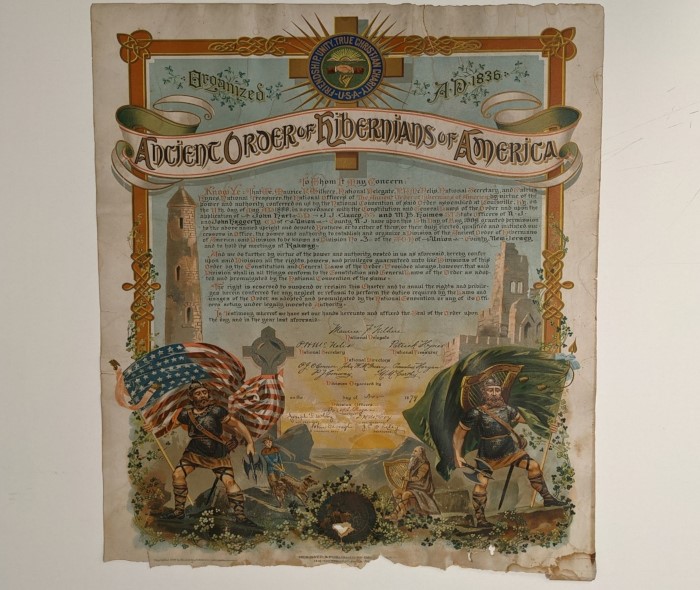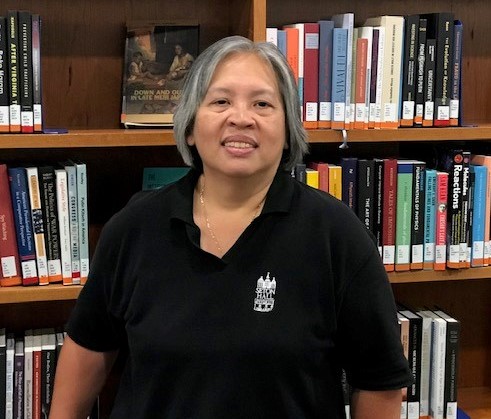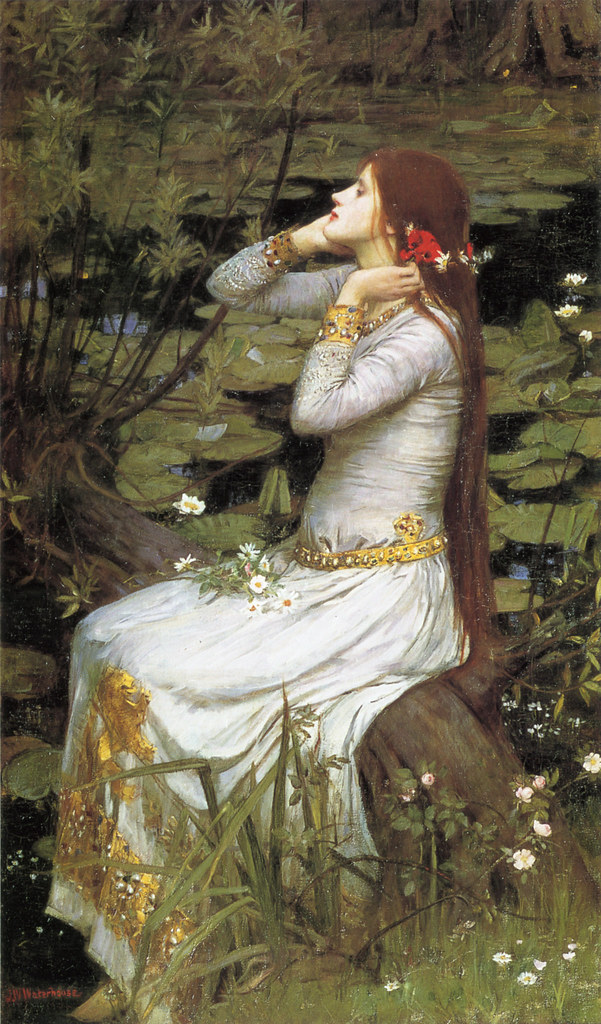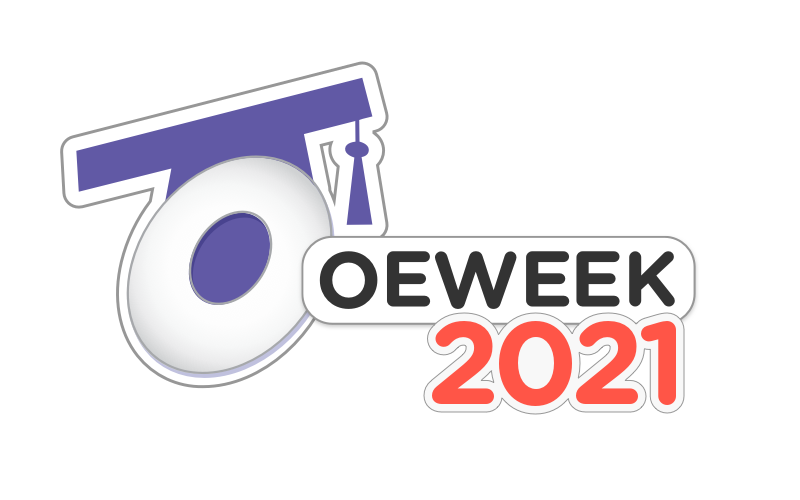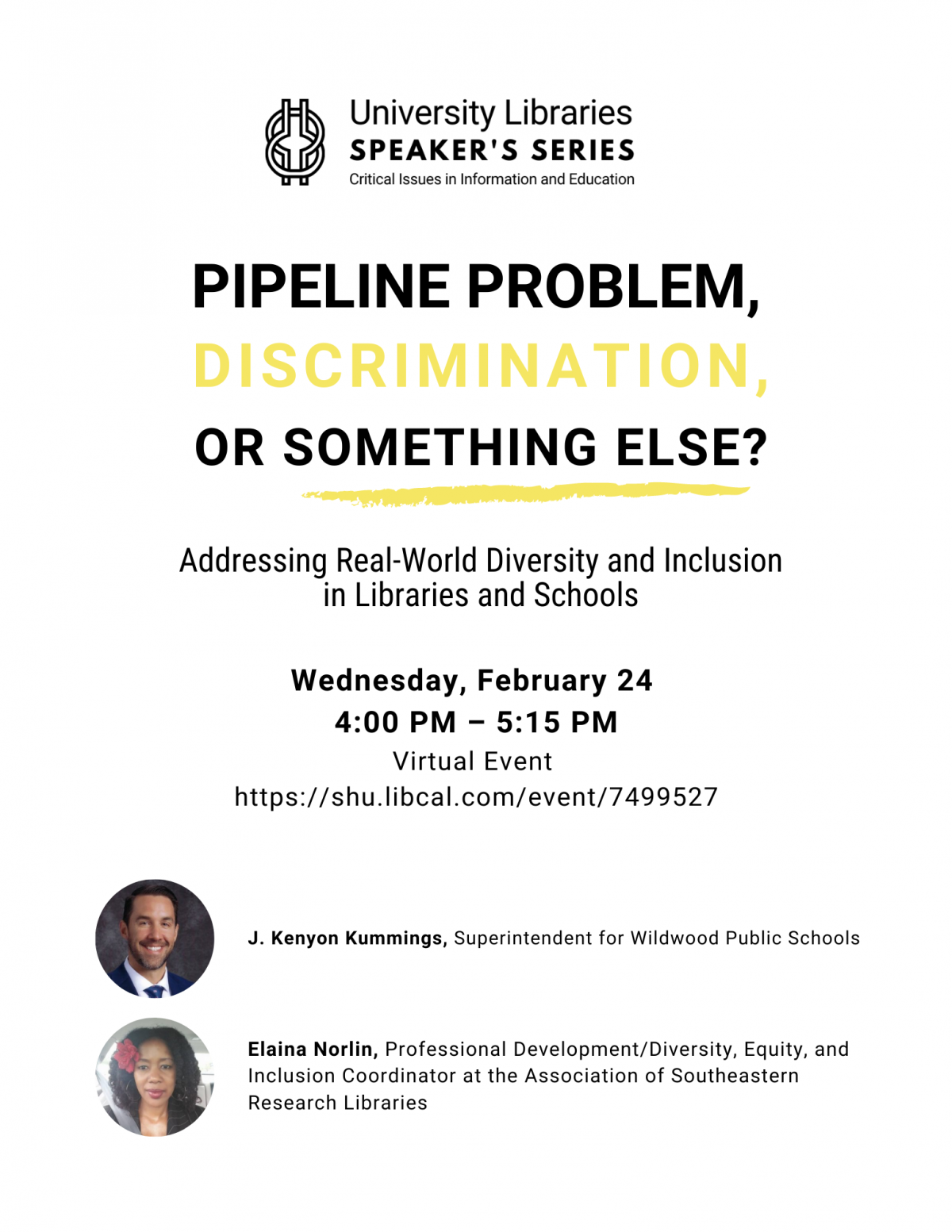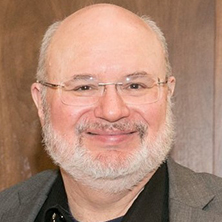The Monsignor William Noe Field Archives and Special Collections has received a grant from the New Jersey Historical Commission to process its collections documenting Irish immigrant history. The project, titled “Irish Immigrant Solidarity in New Jersey, 1870-Present,” will organize and preserve an enormous collection of papers donated to the archives by John Concannon, the historian of the Ancient Order of the Hibernians, as well as three smaller collections: records of the Montclair chapter of the Knights of Columbus, the papers of James McFarland which document the activities of the Trenton branch of the Ancient Order of the Hibernians, and the records of the Ancient Order of the Hibernians from Bergen County and Rahway. These records build on Seton Hall’s long history of engagement with Irish American culture to illustrate the communal bonds that supported these immigrants as they built new lives in America. Immigrant history is a particular strength of Seton Hall’s Special Collections, and this grant will assist the archives in the preservation of this history for future generations, as well as sharing it with students and faculty today.
Author: Gerard Shea
Mabel Wong Honored for 30 Years of Exceptional Service
Mabel A. Wong’s friendly and familiar face has been seen at Walsh Library since it opened in 1994. Mabel, the Walsh Library Circulation Supervisor, received her 30-year Seton Hall service award in March. The original ceremony was postponed last year due to the pandemic and held on Teams this year. Associate Vice President for Human Resources, Michael Silvestro, presented the service award to Mabel. University President, Dr. Joseph Nyre, also spoke at the event. Mabel was presented with a certificate and a pin to commemorate her 30 years of service to the University. Mabel has “a whole collection of pins” for each milestone year she has served at Seton Hall. Mabel was also awarded the McQuaid Medal for Distinguished Service in 2010.
Mabel, the longest tenured employee at Walsh Library, started as a circulation clerk at McLaughlin Library in April of 1989. McLaughlin Library preceded the Walsh Library on the South Orange Campus. Mabel said, “I think back to when I started and it’s a world of difference.” There was no automated circulation system and the circulation staff used punch cards to check books out. Mabel also typed out overdue notices that were sent out by mail. The circulation desk was busier because reserves were available only in print and the ten microfilm machines always had people waiting to use them. Mabel thinks things are better now because the library provides easier access to more information. The best part of the job for Mabel is talking to the students. She is still in touch through Facebook with students she knew from McLaughlin Library. Thank you to Mabel for her exceptional and dedicated service. We hope to see her friendly face at the Walsh Library circulation desk for years to come!
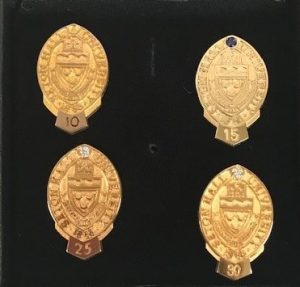
Come Celebrate Shakespeare at the University Libraries
To mark the 457th anniversary of Shakespeare’s birth, University Libraries highlights resources focused on one of the world’s greatest playwrights.
If you would like to watch productions of Shakespeare’s most famous plays, please check out the BBC Shakespeare Plays. This collection features 37 plays produced by the British Broadcasting Corporation (BBC).
The New Oxford Shakespeare presents an entirely new consideration of all of Shakespeare’s works, edited from first principles from the original texts themselves, and drawing on the latest textual and theatrical scholarship. The Oxford Scholarly Editions Online brings the content of all three print volumes together as one powerful resource.
Additionally, University Libraries subscribes to some of the top Shakespeare studies journals including: Shakespeare, Shakespeare Quarterly and Shakespeare Studies. Shakespeare is a peer-reviewed journal devoted to the study of Shakespeare. It publishes articles on criticism, performance, and the history of Shakespeare and his works. Shakespeare Quarterly is peer-reviewed journal published for the Folger Shakespeare Library by the Oxford University Press. The journal publishes original works related to all aspects of Shakespeare studies. Shakespeare Studies is a peer-reviewed volume published annually with a focus on Shakespeare studies and theatre. The journal features the work of performance scholars, literary critics, and cultural historians.
Lastly, the Library provides access to subscription-based or open-access scholarly resources such as Folgerpedia, Open-Source Shakespeare, JSTOR Understanding Shakespeare, and Shakespeare in the Digital Age from the University of Notre Dame.
Ophelia Master’s Thesis Gets 2000 Hits: Mystery Solved?
The master’s thesis: Ophelia’s Mistreatment and Ignored Monastic Opportunities by Seton Hall graduate Danielle Tovsen has been downloaded nearly 2000 times since the end of 2017. Tovsen graduated from Seton Hall in 2010 with an MA in English. She argues in her thesis “that Ophelia could have saved her own life if she had left home and fled to a nunnery; the treatment she received from Laertes and Polonius was worse than Hamlet’s treatment of her throughout the play.”
Dr. Marta Deyrup, Outreach and Humanities Librarian at University Libraries, discovered the thesis while doing research on Shakespeare in the Seton Hall eRepository. The high number of downloads impressed Dr. Deyrup, which led her to contact Dr. Chrysanthy Grieco, the advisor on the thesis and both a former dean of University Libraries and chair of the English Department. Dr. Grieco could not answer why it has had close to 2000 hits, but she did say “that’s an astounding number for an MA paper.” She also guessed “that those interested in feminist texts—though I doubt this is one—found some yeast for their bread” in Tovsen’s work.
Another interesting aspect of the mystery is the location of the downloads. A good number of the downloads were from educational institutions such as the Michigan Statewide Educational Network and Orange County Department of Education. Dr. Deyrup thinks this might indicate the thesis is being used to support the research of middle and high school students.
Seton Hall University Libraries Celebrate Open Education Week 2021
Open Education Week will take place this year from Monday, March 1st — Friday, March 5th. Started in 2012, Open Education Week is an opportunity to share and learn about the latest achievements in open education. Open Educational Resources (OER) are teaching, learning or research materials that are in the public domain or released with intellectual property licenses that facilitate the free use, adaptation and distribution of resources” (UNESCO, 2019).
To coincide with Open Education Week, University Libraries is sponsoring several events:
1. Wednesday, March 3rd from 12:30pm – 1:30pm the Center for Faculty Development is presenting an online workshop — Reducing Book Costs for Students with Open Educational Resources — co-sponsored with Seton Hall University Libraries. At this workshop, Seton Hall librarians will explain the benefits of OER, demonstrate how library resources can help bring down the cost of textbooks, and provide faculty with practical tools and resources for using open textbooks in their courses. To join the workshop click here.
2. Thursday, March 4th from 3:00pm – 4:00pm join us for a roundtable discussion on the benefits and challenges of integrating open educational resources, open textbooks and/or library e-resources in your courses. If you have had experience with open materials or are interested in learning more about them, we would love to hear from you. This event is open to faculty, administrators and students – come and be heard! To join the discussion on Teams click here.
3. Friday, March 5th @ 10:30 TLTC is hostinga virtual session Leveraging Open Educational Resources. Explore the wide range of Open Educational Resources (OER) that reside in the public domain and are free to use for teaching and learning. Register here.
4. Friday, March 5th from 10:00am-12pm, then 1:00pm-3:00pm Seton Hall Librarians will provide virtual office hours for anyone who has questions about OER. Feel free to meet with:
Prof. Gerry Shea (Communication Librarian)
10:00am-12pm Join on Teams
Prof. Kyle Downey (Nursing/Heath Science Librarian)
1:00pm-3:00pm Join on Teams
Prof. Lisa Rose-Wiles (Science Librarian)
10:00am-12pm Join on Teams
1:00pm-3:00pm Join on Teams
Want to learn more about OER?
Reach out to Prof. Gerry Shea | Explore our OER Research Guide here
February Speaker’s Series Event
#SHU_Libraries is pleased to announce the next event in our Speaker’s Series: Critical Issues in Information and Education—
“Pipeline Problem, Discrimination, Or Something Else? Addressing Real-World Diversity and Inclusion in Libraries and Schools.”
***View a recording of the event here***
When: Wednesday, February 24, 2021 (4:00-5:15pm)
About Our Speakers:
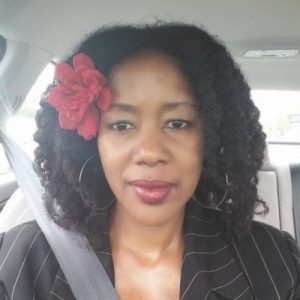
Elaina Norlin is the Professional Development/Diversity, Equity, and Inclusion Coordinator at the Association of Southeastern Research Libraries (ASERL). In her role, Ms. Norlin develops and expands ASERL’s Professional Development programming, including the development of new activities to advance ASERL’s goals for Diversity, Equity, and Inclusion (DEI). “As the ASERL Professional Development/DEI Coordinator, I’m passionate about transforming workplace organizations from dysfunctional to a place everyone feels valued, respected and honored for their unique and special contributions to the organization.”
For ten years, Ms. Norlin served as Executive Director of the African American Research Library and Cultural Center in Fort Lauderdale, overseeing significant programmatic growth and community outreach activities. She previously worked for OCLC, the US Institute for Museum and Library Services (IMLS), and the University of Arizona.
In addition, Ms. Norlin works closely with leaders and educators to develop, implement, and assess programs that support diversity, equity, and inclusion, employee engagement, institutional growth, and workplace culture.
Ms. Norlin earned her Bachelor of Arts in Communications (Advertising) from the University of Illinois Urbana-Champaign, her Master of Library and Information Science is also from the University of Illinois Urbana-Champaign.
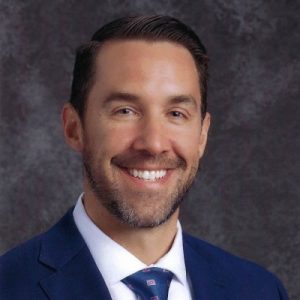
J. Kenyon Kummings is the Superintendent for Wildwood Public Schools (WPS). Mr. Kummings has served as the Superintendent for WPS since 2014. Prior to assuming that role he was the elementary school principal for seven years. WPS has a high percentage of economically disadvantaged students and is racially and ethnically diverse. The district is unique in that it continuously has one of the highest percentages of students living in poverty in the state of New Jersey (50%). WPS is the only P-12 Urban district in Cape May County and has been fine tuned to meet the needs of its students given that its demographic consists of large populations of special education students (24%), and English Language Learners (35% Pre-K to 8thGrade).
Mr. Kummings has testified several times before the New Jersey Senate and Assembly, and most recently before the Joint Committee on the Public Schools regarding the recruitment of minority education candidates. His testimony from that day along with the expert testimony of representatives of Educator Preparation Programs (EPP’s) identified that there are systemic barriers to entering EPP’s, many of which are attributed to standardized assessments that are leading to inequitable outcomes.
Mr. Kummings earned his Bachelor of Arts from Rutgers University, his Masters of Education in Educational Leadership from The College of New Jersey, and is currently working on a Doctorate in Educational Leadership at Rowan University.
Dr. Wyatt Murphy on Open Educational Resources
To help foster a constructive conversation about Open Educational Resources (OER), University Libraries asked Dr. Wyatt Murphy, Professor in the Department of Chemistry and Biochemistry at Seton Hall, his thoughts about how OER can help students and faculty.
University Libraries have been at the forefront of promoting Open Educational Resources (OER) on campus. Can you share your thoughts on how OER can help students and faculty as an alternative to the traditional publisher textbook model?
As a student, when you are talking about a $250 textbook that is being used all over and it’s been homogenized, there’s not much there, it’s disposable. A question student should ask: is this book good enough for me to keep, am I going to get value out of this?
But if the OER textbook book costs nothing, and if it’s equivalent to the publisher’s textbook, there’s more value to an open source book. Students can keep it; they can mark it up any way they want digitally. In an open source textbook, the quality and creativity is often greater than a standard textbook, and that’s going to just expand.
With OER textbooks the thing I like best is: I might not want to write a whole book, but I might want to write a chapter because I have a different way of looking at things, you know (I’ve been teaching for almost 40 years) and I found that this is a better way to teach this. The conversations we’ve had over in Chemistry where, we’re bouncing around ideas about how to do things, we kind of have to find books that fit it. We can put a book together but it’s assembling other people’s stuff.
I think that a lot of people look at open sources, and think “Well, it’s free. It can’t be good.” My experience is “It’s free and it’s great!” I’ve used this book Chemistry: Atoms First 2e now it’ll be two years by end of the summer 2020. When you walk into class and when you put in your syllabus that the book is free, the students are going to love you, you know, you’re a hero. And the thing is, I don’t feel like I’m compromising my choice.
To learn more about Open Educational Resources, please visit our OER Research Guide.

